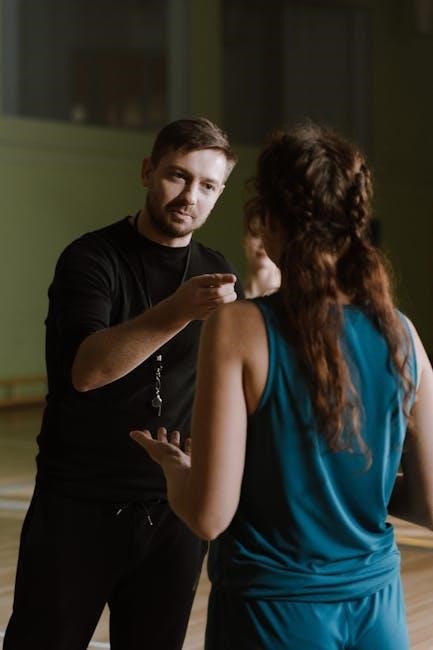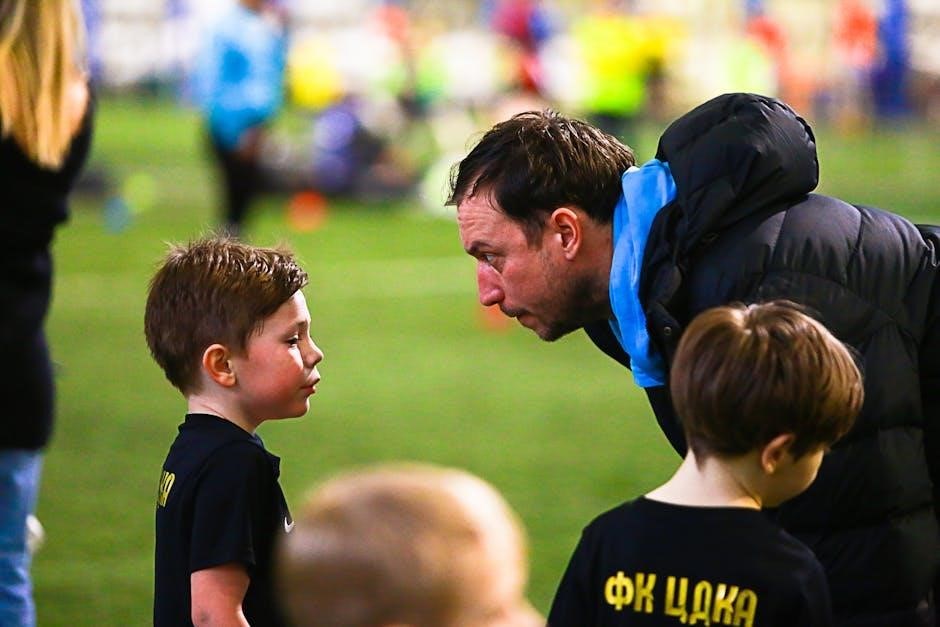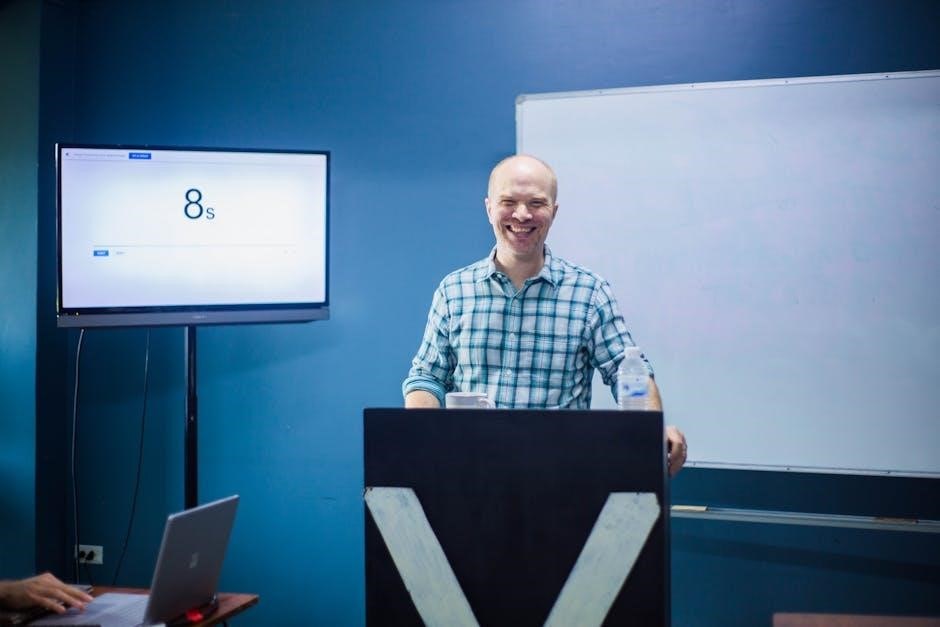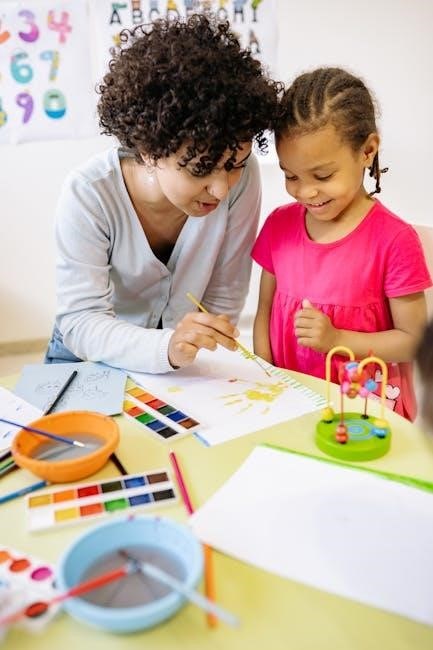The JROTC Leadership Education and Training Program fosters leadership, citizenship, and character development through structured courses and activities, preparing students for future roles in both military and civilian life.
Overview of the JROTC Program

The Junior Reserve Officers Training Corps (JROTC) is a federal program offered in U.S. high schools, emphasizing leadership, citizenship, and character development. It is open to students in grades 9-12 and is typically taken as an elective course. The program combines classroom instruction with extracurricular activities, such as drill competitions, community service, and field training exercises, to provide a well-rounded experience. JROTC is designed to prepare students for leadership roles in both military and civilian life, fostering teamwork, discipline, and responsibility. Its curriculum is based on performance-based, learner-centered education, promoting core abilities essential for future success.
Through its structured program, JROTC equips cadets with skills in communication, problem-solving, and critical thinking. The program also encourages physical fitness and wellness, aligning with its mission to develop capable and compassionate leaders. By integrating academic and practical learning, JROTC creates a comprehensive environment for personal and professional growth, preparing students to excel in their chosen paths.
Mission and Purpose of JROTC
The mission of the Junior Reserve Officers Training Corps (JROTC) is to develop leadership, citizenship, and character in high school students. Its purpose is to prepare cadets for success in both military and civilian life by fostering ethical decision-making, civic engagement, and personal responsibility. JROTC aims to create well-rounded individuals equipped with critical life skills such as teamwork, discipline, and problem-solving. The program emphasizes community service, patriotism, and respect for constitutional rights, while promoting physical fitness and wellness. By instilling these values, JROTC shapes future leaders capable of making a positive impact in their communities and beyond.
Structure and Organization of JROTC
The JROTC program is structured into four Leadership Education and Training (LET) courses, each building on the previous to develop leadership and citizenship skills. The program is organized into a four-year curriculum, with LET 1 through LET 4 courses, each focusing on progressively advanced topics. Cadets also participate in extracurricular activities such as drill teams, field training exercises, and community service. The program is led by retired military instructors who guide cadets through classroom instruction, practical exercises, and real-world applications. This hierarchical structure ensures a balanced development of leadership, character, and civic responsibility, preparing students for future challenges in both military and civilian life.

Program of Instruction
The JROTC Program of Instruction offers four LET courses and electives, combining classroom instruction with hands-on activities to build leadership, citizenship, and character, preparing cadets for future roles.
Leadership Education and Training (LET) Courses
The JROTC Leadership Education and Training (LET) courses are designed to progressively develop leadership skills, starting with foundational concepts in LET 1 and advancing through LET 4. These courses emphasize leadership theory, practical application, and ethical decision-making. LET 1 introduces cadets to basic leadership principles and citizenship, while LET 2 focuses on leadership theory and its real-world application. LET 3 delves into advanced leadership and management techniques, preparing cadets for higher-level responsibilities. LET 4 culminates in refining managing leader skills, equipping cadets to lead effectively in various scenarios. The curriculum is structured to foster personal growth, teamwork, and problem-solving abilities, ensuring cadets are well-prepared for future challenges.
LET 2: Leadership Theory and Application
LET 2: Leadership Theory and Application builds on the foundational concepts introduced in LET 1, focusing on the practical application of leadership theories and models. Cadets explore advanced leadership principles, including communication strategies, decision-making processes, and team dynamics. The course emphasizes ethical leadership, problem-solving, and adaptability, preparing cadets to lead in diverse situations. Through case studies and hands-on activities, students learn to apply leadership theories to real-world scenarios, fostering critical thinking and creativity. This course is designed to deepen cadets’ understanding of effective leadership and equip them with the skills to inspire and guide others in achieving shared goals.
LET 3: Advanced Leadership and Management
LET 3: Advanced Leadership and Management delves into sophisticated leadership concepts, focusing on organizational behavior, decision-making, and management techniques. Cadets learn to analyze complex leadership challenges, develop strategic plans, and implement effective solutions. This course emphasizes the importance of ethical leadership, communication, and teamwork in managing diverse groups. Through simulations and real-world applications, students refine their ability to lead with confidence and adapt to dynamic environments. LET 3 prepares cadets to take on higher levels of responsibility, fostering the skills necessary to excel as leaders in both military and civilian settings. This course builds on earlier lessons, enhancing practical leadership capabilities.
LET 4: The Managing Leader
LET 4: The Managing Leader is the final course in the JROTC Leadership Education and Training Program, focusing on advanced leadership evaluation and mentorship. Cadets learn to assess leadership effectiveness, develop mentorship skills, and refine their ability to inspire and guide others. This course emphasizes the transition from theory to practice, preparing cadets for higher-level leadership roles. Through practical exercises and case studies, students explore real-world leadership challenges, fostering adaptability and decision-making. LET 4 equips cadets with the tools to lead diverse teams, manage resources, and achieve organizational goals, culminating their JROTC leadership education and preparing them for future leadership responsibilities.
Elective Courses in JROTC
JROTC offers a variety of elective courses designed to expand cadets’ knowledge and skills beyond the core Leadership Education and Training (LET) curriculum. These courses allow cadets to explore specialized areas such as aerospace science, military history, first aid, and leadership strategies. Electives provide hands-on experiences, fostering critical thinking and practical application of leadership principles.
Examples include courses on leadership theory, communication strategies, and team-building techniques. These electives complement the core program by offering deeper insights into specific aspects of leadership and citizenship, preparing cadets for diverse challenges in both military and civilian settings. They enhance overall program outcomes by encouraging personalized growth and skill development.

Leadership Development
The JROTC program fosters leadership skills through practical application, emphasizing teamwork, decision-making, and problem-solving. Cadets develop confidence and responsibility, preparing them for future leadership roles in various settings.
Leadership Theories and Models
The JROTC program introduces cadets to foundational leadership theories and models, such as the Three-Step Problem Solving Model and the Be-Know-Do framework. These theories emphasize understanding leadership principles, fostering self-awareness, and applying practical skills. Cadets explore various leadership styles, including transformational and situational leadership, to adapt to different scenarios. The curriculum also incorporates ethical decision-making models, teaching cadets to align their actions with core values. By studying these theories, cadets develop a comprehensive understanding of leadership, enabling them to effectively guide teams and make informed decisions in diverse contexts. This theoretical foundation is essential for building confident and capable leaders.
Practical Application of Leadership Skills
The JROTC program emphasizes hands-on opportunities for cadets to apply leadership skills in real-world scenarios. Through activities like team leadership problems, drill and ceremony competitions, and community service, cadets practice decision-making, communication, and problem-solving. These exercises foster collaboration and accountability, allowing cadets to experience leadership roles firsthand. The program also incorporates field training exercises (FTX) and leadership challenges, where cadets navigate complex tasks that simulate real-life leadership situations. By applying theoretical knowledge in practical settings, cadets build confidence, resilience, and the ability to lead effectively in diverse environments, preparing them for future challenges in both military and civilian contexts.
Leadership Assessment and Feedback
The JROTC program incorporates regular leadership assessments to evaluate cadets’ progress in developing and applying leadership skills. Instructors observe cadets during practical exercises, such as team leadership problems and field training, to identify strengths and areas for improvement. Feedback is provided through formal evaluations, peer reviews, and one-on-one mentorship sessions. This constructive feedback helps cadets refine their leadership styles, build confidence, and address challenges. The assessment process ensures that cadets are well-prepared to take on leadership roles in their communities and beyond, aligning with the program’s mission to develop capable and ethical leaders. Continuous improvement is a core focus of the JROTC experience.

Citizenship Education
The JROTC program emphasizes community service, civic engagement, and understanding constitutional rights, fostering responsible citizenship and preparing students for active participation in society. Activities include patriotic events and service projects.
Community Service and Civic Engagement
JROTC emphasizes community service and civic engagement as vital components of leadership development. Cadets participate in local service projects, such as food drives, clean-up initiatives, and disaster relief efforts, fostering a sense of social responsibility. These activities teach teamwork, empathy, and the importance of giving back to the community. Civic engagement is further promoted through patriotic events, parades, and ceremonies, which instill pride in national heritage and encourage active citizenship. By engaging in these efforts, cadets develop a strong moral foundation and a commitment to improving society, aligning with JROTC’s mission to produce responsible and informed leaders.
Patriotic and Ceremonial Events
Patriotic and ceremonial events are integral to the JROTC program, fostering national pride and respect for tradition. Cadets participate in activities such as flag ceremonies, parades, and Veterans Day events, which honor military service and American heritage. These events emphasize discipline, unity, and the importance of ceremony in military and civic life. By engaging in these traditions, cadets develop a deeper understanding of their role as future leaders and citizens, while also strengthening their sense of duty and patriotism. Such events are a cornerstone of JROTC’s mission to inspire and prepare cadets for responsible leadership.
Understanding Constitutional Rights and Responsibilities
The JROTC program emphasizes the importance of understanding constitutional rights and responsibilities, preparing cadets to be informed and engaged citizens. Through structured lessons and discussions, cadets explore the principles of the Constitution, including the Bill of Rights and civic duties. This education fosters a deeper appreciation for the privileges and obligations of citizenship. Cadets also learn about the role of the military in protecting these rights, aligning with JROTC’s mission to inspire patriotism and responsible leadership. By understanding their constitutional rights and responsibilities, cadets are better equipped to contribute positively to their communities and uphold democratic values in their future endeavors.

Character Development
JROTC emphasizes ethical decision-making, integrity, and respect, fostering a strong moral foundation. Cadets learn accountability, self-discipline, and the importance of ethical leadership, shaping their character for future success.
Ethical Decision-Making and Moral Leadership
Ethical decision-making is a cornerstone of JROTC, teaching cadets to apply moral principles in leadership roles. Through structured lessons, case studies, and group discussions, students learn to analyze situations, consider ethical implications, and make informed choices. These skills are essential for developing responsible leaders who can navigate complex challenges with integrity. JROTC instructors guide cadets in understanding the consequences of their decisions, fostering a culture of accountability and respect. By emphasizing moral leadership, the program prepares students to face real-world dilemmas with confidence and ethical clarity, benefiting them throughout their lives.

Importance of Mentorship in JROTC
Mentorship is a vital component of the JROTC program, fostering personal growth and leadership development among cadets. Senior cadets and instructors serve as role models, providing guidance and support to younger students. This relationship helps build confidence, ethical decision-making, and a sense of responsibility. Mentorship in JROTC encourages cadets to strive for excellence, both academically and personally, while preparing them for leadership roles. By creating a supportive environment, mentorship strengthens the bonds within the program and equips cadets with the skills and values necessary for success in their future endeavors.
Extracurricular Activities
JROTC offers various extracurricular activities, including drill and ceremony competitions, field training exercises, and leadership challenges, fostering teamwork, discipline, and personal growth while preparing cadets for future challenges.
Drill and Ceremony Competitions
Drill and Ceremony Competitions are integral to the JROTC program, fostering discipline, teamwork, and precision. Cadets participate in synchronized movements, showcasing their ability to follow commands and maintain unity. These events emphasize military bearing, posture, and coordination, while promoting esprit de corps. Competitions often include rifle drills, color guard presentations, and ceremonies, allowing cadets to demonstrate their mastery of protocols. Participation in these activities enhances leadership skills, as cadets take on roles such as squad leaders or platoon guides. The structured environment of competitions teaches cadets the importance of precision and teamwork, preparing them for challenges in both military and civilian life. Through these events, cadets develop confidence, discipline, and the ability to perform under pressure, aligning with JROTC’s mission to build capable and responsible leaders.
Field Training Exercises (FTX)
Field Training Exercises (FTX) are hands-on, immersive experiences designed to test cadets’ leadership, teamwork, and problem-solving skills in real-world scenarios. These exercises often involve obstacle courses, map navigation, and simulated combat situations, fostering adaptability and quick decision-making. Cadets are challenged to work collaboratively, applying lessons learned in the classroom to practical tasks. FTX events also emphasize physical fitness, mental resilience, and strategic thinking. By participating in these exercises, cadets develop a deeper understanding of military protocols and build camaraderie with their peers. FTX is a cornerstone of JROTC, preparing students for the challenges of leadership and teamwork in both military and civilian contexts.
Leadership Challenges and Team-Building Activities
Leadership challenges and team-building activities are integral to JROTC, fostering collaboration, creativity, and resilience among cadets. These exercises include problem-solving tasks, group projects, and physical challenges that require coordination and communication. Cadets learn to delegate responsibilities, trust their peers, and adapt to dynamic situations. Activities such as obstacle courses, scavenger hunts, and strategy games encourage critical thinking and unity. By overcoming these challenges, cadets develop strong leadership qualities, mutual trust, and a sense of accountability. These experiences prepare them to thrive in collaborative environments and tackle real-world challenges with confidence and determination.

Assessment and Evaluation
JROTC assessment and evaluation focus on measuring cadets’ progress in leadership, citizenship, and character development through performance-based education and feedback mechanisms, ensuring alignment with program goals.
Performance Evaluation in JROTC
Performance evaluation in JROTC is a systematic process to assess cadets’ leadership, citizenship, and character development. Evaluations include practical exercises, drill competitions, and community service participation. Cadets are evaluated on communication skills, problem-solving abilities, and teamwork. Feedback is provided to enhance personal growth and leadership effectiveness. Evaluations align with program goals, ensuring cadets meet standards for advancement. This process helps identify strengths and areas for improvement, preparing cadets for future challenges in both military and civilian contexts. Regular assessments ensure continuous development and readiness for leadership roles.
Role of Feedback in Leadership Development
Feedback plays a vital role in leadership development within JROTC, enabling cadets to refine their skills and achieve personal growth. Constructive feedback from instructors and peers helps identify strengths and areas for improvement, fostering self-awareness and accountability. By addressing communication, decision-making, and problem-solving abilities, feedback empowers cadets to enhance their leadership effectiveness. Regular feedback loops ensure continuous development, preparing cadets for future challenges. This collaborative process strengthens their ability to lead, adapt, and succeed in both military and civilian contexts, building confident and capable leaders.
Skill Development
JROTC emphasizes enhancing communication, problem-solving, and critical thinking skills, while promoting physical fitness and wellness to build well-rounded, capable individuals prepared for future challenges.
Communication and Presentation Skills
JROTC places a strong emphasis on developing cadets’ ability to communicate effectively and present ideas with confidence. Through structured lessons, cadets learn public speaking techniques, speech writing, and how to engage audiences. They are taught to articulate their thoughts clearly, both verbally and in writing, to convey messages effectively. The program also incorporates activities that require teamwork and collaboration, fostering problem-solving and critical thinking. Cadets participate in drills, community service, and leadership challenges, where clear communication is essential. These skills are refined through practice, enabling cadets to become persuasive and confident communicators, prepared for leadership roles in both military and civilian settings.
Problem-Solving and Critical Thinking
JROTC emphasizes the development of problem-solving and critical thinking skills through practical exercises and real-world scenarios. Cadets engage in team leadership challenges, field training exercises, and drills that require analytical thinking. These activities teach cadets to assess situations, evaluate options, and make informed decisions. The program encourages cadets to approach problems methodically, considering both individual and team perspectives. Critical thinking is further reinforced through classroom discussions and case studies, preparing cadets to address complex issues effectively. These skills are essential for leadership roles, enabling cadets to navigate challenges confidently in both military and civilian contexts.
Physical Fitness and Wellness
JROTC places a strong emphasis on physical fitness and wellness to build cadets’ mental and physical resilience. Regular physical training sessions, obstacle courses, and team sports foster a culture of health and teamwork. Cadets learn to set fitness goals, track progress, and maintain a healthy lifestyle. The program also incorporates education on nutrition, stress management, and overall well-being. Physical fitness is seen as a cornerstone of leadership, teaching discipline, perseverance, and the importance of maintaining a strong body and mind. These habits prepare cadets for challenges in both military and civilian life, promoting lifelong health and vitality.

Impact of JROTC

JROTC profoundly shapes students’ futures, equipping them with leadership, discipline, and critical skills. It prepares cadets for college, careers, and military service, fostering personal growth and responsibility.
Preparing Students for College and Career
The JROTC program excels at preparing students for both college and career by fostering critical life skills such as communication, problem-solving, and leadership. Through its structured curriculum, cadets gain hands-on experience in decision-making and teamwork, which are invaluable in academic and professional settings. The program emphasizes discipline, responsibility, and time management, traits that contribute to success in higher education and the workforce. Additionally, JROTC’s focus on ethical decision-making and civic engagement equips students to excel in diverse career paths, whether in the military, public service, or private sectors. This comprehensive approach ensures cadets are well-rounded and prepared for future challenges.
Personal Growth and Self-Improvement
The JROTC program emphasizes personal growth and self-improvement by fostering self-confidence, resilience, and self-awareness. Cadets engage in activities that promote emotional intelligence, ethical decision-making, and moral leadership, empowering them to set and achieve personal goals. Through mentorship and hands-on experiences, students develop a strong sense of responsibility and accountability, which are essential for lifelong success. The program’s focus on physical fitness and wellness further encourages cadets to adopt healthy habits and maintain a balanced lifestyle. By nurturing these qualities, JROTC equips students with the tools to continuously improve themselves and become well-rounded individuals capable of overcoming challenges in all areas of life.
The Role of JROTC in Shaping Future Leaders
The JROTC program plays a pivotal role in shaping future leaders by providing a comprehensive foundation in leadership, citizenship, and character development. Through structured courses and hands-on activities, cadets learn critical skills such as decision-making, problem-solving, and communication. The program fosters a sense of responsibility and accountability, preparing students for leadership roles in both military and civilian contexts. By emphasizing ethical decision-making and teamwork, JROTC equips cadets with the confidence and competence to inspire and lead others effectively. This transformative experience empowers students to become capable leaders who positively impact their communities and society at large.
The JROTC Leadership Education and Training Program effectively prepares students for future challenges by fostering leadership, citizenship, and character development, empowering them to succeed in all endeavors.
Future of JROTC Leadership Education and Training
The future of JROTC Leadership Education and Training lies in continuous improvement and adaptation to meet evolving challenges. The program will focus on enhancing leadership, citizenship, and character development through advanced curriculum updates and technology integration. Emphasis will be placed on real-world applications, fostering adaptability and innovation; By incorporating feedback from cadets and instructors, JROTC will remain relevant, preparing students to lead in diverse environments. The program will also expand opportunities for community engagement and global awareness, ensuring cadets are well-equipped to address future societal needs. This evolution will solidify JROTC’s role in shaping tomorrow’s leaders.
Continuous Improvement and Adaptation
The JROTC Leadership Education and Training Program is committed to continuous improvement and adaptation to ensure it remains relevant and effective. By integrating feedback from cadets, instructors, and alumni, the curriculum evolves to address modern challenges and societal changes. Technology is being leveraged to enhance learning experiences, with digital tools and interactive modules becoming integral to the program. Adaptive assessments and personalized learning strategies are also being implemented to cater to diverse learning styles. These advancements ensure that JROTC remains a dynamic and responsive program, equipping cadets with the skills and knowledge needed to thrive in an ever-changing world.
